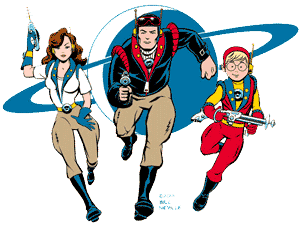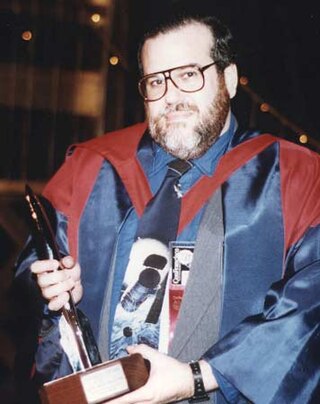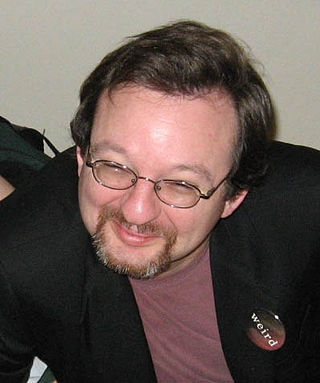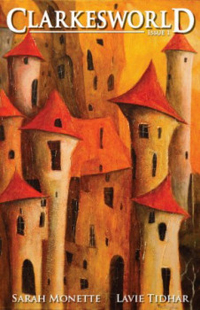
A science-fiction fanzine is an amateur or semi-professional magazine published by members of science-fiction fandom, from the 1930s to the present day. They were one of the earliest forms of fanzine, within one of which the term "fanzine" was coined, and at one time constituted the primary type of science-fictional fannish activity ("fanac").

The Hugo Award for Best Fanzine is given each year for non professionally edited magazines, or "fanzines", related to science fiction or fantasy which has published four or more issues with at least one issue appearing in the previous calendar year. Awards were also once given out for professional magazines in the professional magazine category, and since 1984 have been awarded for semi-professional magazines in the semiprozine category; several magazines that were nominated for or won the fanzine category have gone on to be nominated for or win the semiprozine category since it was established. The Hugo Awards have been described as "a fine showcase for speculative fiction" and "the best known literary award for science fiction writing".

The Hugo Award for Best Semiprozine is given each year to a periodical publication related to science fiction or fantasy that meets several criteria having to do with the number of issues published and who, if anyone, receives payment. The award was first presented in 1984, and has been given annually since, though the qualifying criteria have changed. Awards were once also given out for professional magazines in the professional magazine category, and are still awarded for fan magazines in the fanzine category.

Teresa Nielsen Hayden is an American science fiction editor, fanzine writer, essayist, and workshop instructor. She is a consulting editor for Tor Books and is well known for her weblog, Making Light. She has also worked for Federated Media Publishing, when in 2007 she was hired to revive the comment section for the blog Boing Boing. Nielsen Hayden has been nominated for Hugo Awards five times.
Locus: The Magazine of The Science Fiction & Fantasy Field, founded in 1968, is an American magazine published monthly in Oakland, California. It is the news organ and trade journal for the English-language science fiction and fantasy fields. It also publishes comprehensive listings of all new books published in the genres. The magazine also presents the annual Locus Awards. Locus Online was launched in April 1997, as a semi-autonomous web version of Locus Magazine.

The 62nd World Science Fiction Convention (Worldcon), also known as Noreascon 4, was held on 2–6 September 2004 at the Hynes Convention Center, Sheraton Boston Hotel and Boston Marriott Copley Place in Boston, Massachusetts, United States.

The 67th World Science Fiction Convention (Worldcon), also known as Anticipation, was held on 6–10 August 2009 at the Palais des congrès de Montréal in Montréal, Québec, Canada.

The 68th World Science Fiction Convention (Worldcon), also known as Aussiecon Four, was held on 2–6 September 2010 in the Melbourne Convention and Exhibition Centre in Melbourne, Victoria, Australia.
Bay Area Science Fiction Association (BASFA) is a science fiction fandom social club. The organization was founded after a committee meeting for the SiliCon science fiction convention in 1991 by several Bay Area convention organizers (SMOFs) looking for a reason to meet other than at committee meetings. The club has met weekly since 1991, at various locations in the southern portion of the San Francisco Bay Area.

Andrew Ian Porter is an American editor, publisher and active science fiction fan.

Sean Wallace is an American science fiction, fantasy, and horror anthologist, editor, and publisher best known for founding the publishing house Prime Books and for co-editing three magazines, Clarkesworld Magazine, The Dark Magazine, and Fantasy Magazine. He has been nominated a number of times by both the Hugo Awards and the World Fantasy Awards, won three Hugo Awards and two World Fantasy Awards, and has served as a World Fantasy Award judge.

The 69th World Science Fiction Convention (Worldcon), also known as Renovation, was held on 17–21 August 2011 at the Reno-Sparks Convention Center (RSCC) in Reno, Nevada, United States. The Atlantis Casino Resort served as the headquarters/party hotel, with additional rooms supplied by the Peppermill Reno and Courtyard by Marriott.
The Melbourne Science Fiction Club Inc. was founded in May 1952 by Race Mathews and others. It is the second oldest continuously active science fiction club in the world, after the Los Angeles Science Fantasy Society. It meets once a month in Melbourne.

Clarkesworld Magazine is an American online fantasy and science fiction magazine. It released its first issue October 1, 2006, and has maintained a regular monthly schedule since, publishing fiction by authors such as Elizabeth Bear, Kij Johnson, Caitlín R. Kiernan, Sarah Monette, Catherynne M. Valente, Jeff VanderMeer and Peter Watts.
Neil Clarke is an American editor and publisher, mainly of science fiction and fantasy stories.

Nora Keita Jemisin is an American science fiction and fantasy writer. Her fiction includes a wide range of themes, notably cultural conflict and oppression. Her debut novel, The Hundred Thousand Kingdoms, and the subsequent books in her Inheritance Trilogy received critical acclaim. She has won several awards for her work, including the Locus Award. The three books of her Broken Earth series made her the first author to win the Hugo Award for Best Novel in three consecutive years, as well as the first to win for all three novels in a trilogy. She won a fourth Hugo Award, for Best Novelette, in 2020 for Emergency Skin, and a fifth Hugo Award, for Best Graphic Story, in 2022 for Far Sector. Jemisin was a recipient of the MacArthur Fellows Program Genius Grant in 2020.

Cheryl Morgan is a British science fiction critic and publisher. She has won Hugo Awards for her work on the fanzine Emerald City from 1995 to 2006, and as non-fiction editor of Clarkesworld magazine from 2009 to 2011. Morgan was the first openly trans person to win a Hugo Award, and she is currently the editor of the science fiction magazine Salon Futura.

Lynne M. Thomas is an American librarian, podcaster and editor. She has won eleven Hugo Awards for editing and podcasting in the science fiction genre. She is perhaps best known as the co-publisher and co-editor-in-chief of the Hugo Award-winning Uncanny Magazine with her husband, Michael Damian Thomas. With her eleven Hugo Award wins, Thomas is tied with Connie Willis for most wins among women, and sixth all time for most wins amongst all Hugo Award winners.
This is a list of the published works of Aliette de Bodard.
Vajra Chandrasekera is a Sri Lankan author known for his work in fantasy.














